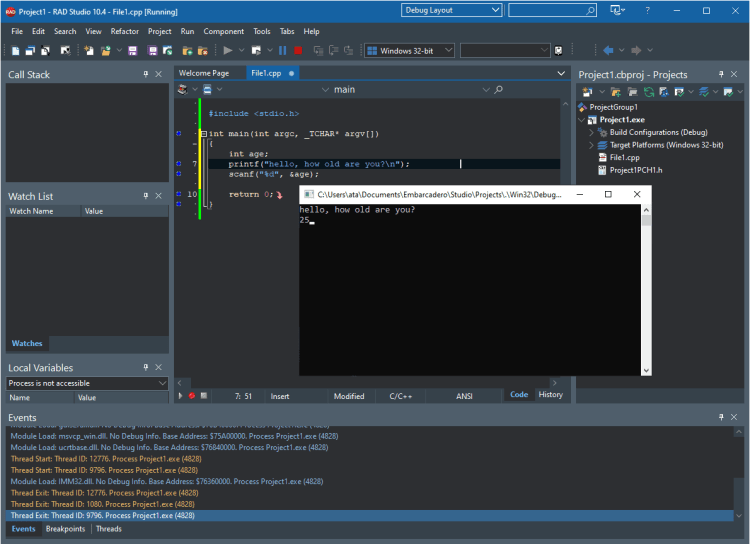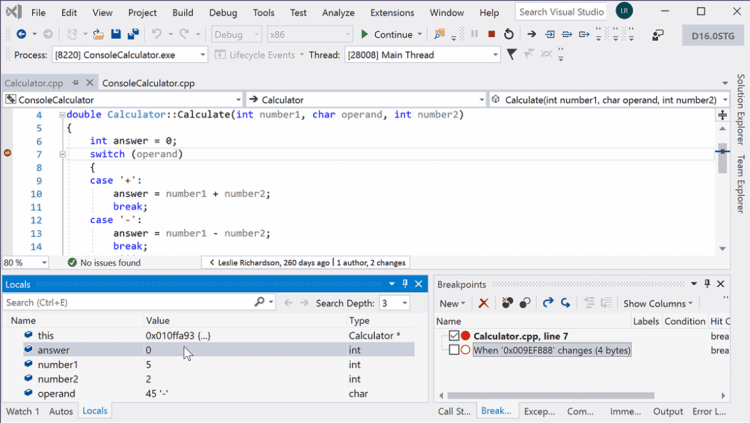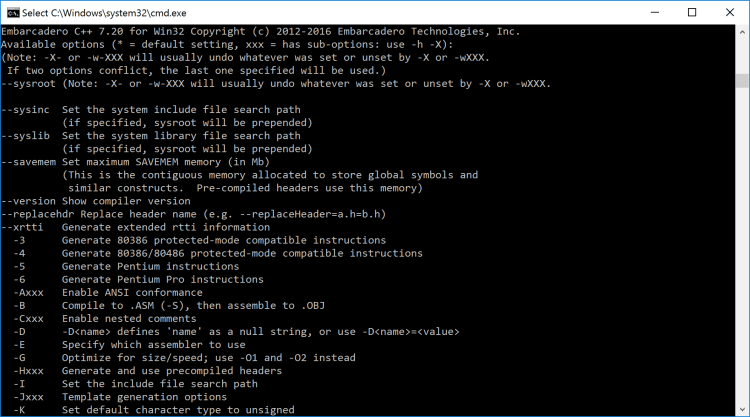
The C++ Programming language is one of the most widely available languages that can be downloaded easily. This means users can develop their small applications for different platforms free. If you want to implement small projects for analysis and calculations without GUIs and many other features, most small compilers will do just fine. If you want to migrate from building simple executable code to complex professional applications, we highly recommend using the Community Editions which are free to use, and then you can switch to a professional C++ compiler with an advanced IDE.
There are two types of programming languages: Interpreted and non-interpreted (compiled). All computers (CPU/GPU) work with machine code (code that can be directly programmed by assembler code) that tells the computer what to do (exe files are this kind of file). This is the most native and fastest code, but it requires writing many lines for simple things and is hard to generalize for all kinds of machines.
A Compiler (C or C++ Compiler, etc.) is a computer program that converts one programming language (i.e. C/C++ code) written with text into executable machine code with a linker. Such code may not be as fast as assembler code, but the difference in speed is very small because both machine code and compiler-based code in text form are much more compatible with other CPU/GPUs and/or with other Operating Systems when you compile them on a machine. This is one reason why C++ is the fastest and most powerful programming language. Interpreted programming languages run inside executable applications like Java, Python, or Visual Basic. This is why they are slower when executing operations, as they need to use compiled libraries for faster operations. Again, they mostly use C/C++ compilers to build these libraries. Using an interpreted programming language is like being carried by a runner, while a compiled (non-interpreted) programming language is like running itself. This subtle difference turns into a huge gap when you test the same routine (i.e. for face recognition) millions of times a second.
Here are the C++ IDEs and Compilers that can be downloaded as a modern C++ compiler for Windows 10 and Windows 11.
Table of Contents
1. C++ Builder 11 (RAD Studio 11) Community Edition / Professional / Architect / Enterprise


C++ Builder is the easiest and fastest C and C++ IDE for building simple or professional applications on the Windows, MacOS, iOS & Android operating systems. It is also easy for beginners to learn with its wide range of samples, tutorials, help files and LSP support for code. C++ Builder comes with Rapid Application Development Studio, also known as RAD Studio, and C++ Builder is one of the most professional IDE’s that work under RAD Studio. It is the oldest IDE (it began as Borland TurboC in 1990 and was later renamed Borland C++ Builder). Under the Embarcadero brand it comes with new versions, features, updates and support. RAD Studio’s C++ Builder version comes with the award-winning VCL framework for high-performance native Windows apps and the powerful FireMonkey (FMX) framework for cross-platform UIs. There is a free C++ Builder Community Edition for students, beginners and startups.
There is a C++ Builder Community Edition Free. Embarcadero’s C++ Builder CE, is a shared free C++ IDE and Compiler for the community of freelance developers, startups, students and non-profits, C++Builder Community Edition is a full featured IDE for building iOS and Windows apps from a single modern C++ codebase (limited commercial use license). C++Builder Community Edition includes a code editor, powerful debugging tools, built-in access to popular local databases with live data at design time, Bluetooth and IoT capabilities and a visual UI designer with support for pixel perfect, platform specific styling.
Here are the features of the C++ Builder CE version;
- Build Windows and iOS C++ Applications 10x Faster with Less Code.
- C++Builder Community Edition provides you with an integrated toolchain and professional-level developer tools from Day 1
- Featuring Clang-enhanced compiler, Dinkumware standard library, MSBuild/CMake/Ninja support, and popular libraries like Boost and Eigen.
- Develop Windows and iOS applications with a single codebase and responsive UI
- Enjoy the award winning Visual Designer using the C++Builder VCL and FireMonkey frameworks for maximum productivity
- Built-in Debugging Tools that allow you to debug on any device
- Build database apps with local/embedded capabilities
- Hundreds of included components to enhance your app and reduce development cycles
- Direct access to InterBase, SQLite, MySQL, SQL Server, Oracle, PostgreSQL, DB2, SQL Anywhere, Advantage DB, Firebird, Access, Informix, MongoDB, and more.
- Licensed for use until your individual revenue from C++Builder applications or company revenue reaches $5,000 US or your development team expands to more than 5 developers
You can download Free the C++ Builder Community Edition (CE) here: https://www.embarcadero.com/products/cbuilder/starter.
Professional developers can use the Professional, Architect or Enterprise versions of C++ Builder. You can download and use the trial version for one month with the same capabilities as the full version . Please visit https://www.embarcadero.com/products/cbuilder.

Learn more about C++ Builder and RAD Studio on their product pages.
2. GNU C/C++ Compiler (GCC, g++) (Free),
GNU GCC is another powerful C/C++ compiler originally written as the compiler for the Unix, Linux and GNU operating system. The GNU system was developed to be 100% free software, and it is efficient with both 32-bit and 64-bit operations. This compiler can be used on Windows using MinGW or CygWin Linux Simulators. Compiled executable files need a small dll to run independently on Windows. It is mostly compatible with CLANG standards.
The GCC Compiler can be used by the Visual Studio Code, Dev C++ and Code Blocks editors, and can be directly used form a Command Prompt or PowerShell session.
It is available on the official product page https://gcc.gnu.org/.
3. TPM GCC Compiler (Free)
In addition to the Linux version of GNU C/C++ there is the TDM GCC Compiler. The TDM-GCC 32/64bit Compiler is a GNU C /C++ compiler. Embarcadero Dev-C++ is a new and improved fork (sponsored by Embarcadero) of Bloodshed Dev-C++ and Orwell Dev-C++. It is a full-featured Integrated Development Environment (IDE) and code editor for the C/C++ programming language. It uses the MinGW port of GCC (GNU Compiler Collection) as its compiler. Embarcadero Dev-C++ can also be used in combination with Cygwin or any other GCC based compiler. Embarcadero Dev-C++ is built using the latest version of Embarcadero Delphi. Embarcadero Dev-C++ also has a low memory footprint because it is a native Windows application and does not use Electron.

Dev-C++ IDE comes with TPM GCC Compiler support. If you are beginner and you want to learn and develop great C++ code, you can use TDM GCC Compiler with the Dev-C++. If you want to use this TDM-GCC compiler, the latest free version The Embarcadero Dev-C++ IDE can be used free with GCC compiler and it is a fast, portable, simple C/C++ IDE for Windows. It is completely free, a great choice for beginners. If you want to work professionally it is highly recommended that you start with the C++ Builder CE version. Dev-C++ can be downloaded from here.

New features of the latest TDM GCC Compiler 10.3 are as below:
- [GCC] The shared memory region for exceptions and winpthreads has been rewritten for better stability and TLS support
- [GCC,binutils] Both the TDM32 and TDM64 editions of GCC and binutils are built with
--enable-nlsand include localization .po files - [GCC] GCC has been built with experimental JIT support for both editions
- [GDB] GDB emits colored output when running under MinTTY
- [GDB] The 64-bit GDB is built with TUI support
- [Installer] Start menu & PATH options stay consistent with previous selection when upgrading
- [Installer] Yes/No choice to open browser to download page if a forced installer update is required
- [Installer] The installer will gracefully block a bundle install from trying to rewrite an existing install from a non-supported edition
- New upstream dependency versions:
- gcc-10.3.0
- gdb-10.2
- binutils-2.36.1 (TDM64 only)
- mingw64-runtime v8-git2021050601 (TDM64 only)
- mingwrt-5.4.2 (TDM32 only)
- w32api-5.4.2 (TDM32 only)
- gmp-6.2.1
- mpfr-4.1.0
- mpc-1.2.1
- isl-0.23
- zstd-1.4.9
- expat-2.2.10 (GDB, both editions)
- termcap-1.3.1 (TDM64-GDB only)
- readline-8.0 (TDM64-GDB only)
- ncurses-6.2 (TDM64-GDB only)
4. Visual C++ Compilers (Visual Studio / Visual Studio Code)

Microsoft’s Visual C++ Compilers are very popular compilers and come with the Visual Studio IDE. Visual Studio crossed the 20-year mark with the release of Visual Studio 2017. There are many versions of the product out there, but in general, you should always pick the latest one. This will allow you to use the latest and greatest features, including the most up-to-date compiler. You’ll also benefit from recent bug fixes and performance improvements. Visual C++ supports CLANG standards as same as C++ Builder and GNU C/C++ while C# has its own specific standards that differ from those for C++. Visual Studio can be downloaded from https://visualstudio.microsoft.com/.

5. Embarcadero C/C++ Compiler (Free)
The Embarcadero C++ Compiler is a free C and C++ compiler for Windows. This package has a compiler and linker, but does not include an IDE. You will need to use an editor to edit code, and use Command Prompt or PowerShell to run and debug your code. C++Builder includes C11 language support, the Dinkumware STL (Standard Template Library) framework, and the complete Embarcadero C/C++ Runtime Library (RTL). In this free version you’ll also find a number of C/C++ command line tools, such as the high-performance linker and resource compiler.
This free C++ compiler can be downloaded from Embarcadero’s Official Web Page : https://www.embarcadero.com/free-tools/ccompiler.

The free C++ Compiler download includes:
- Embarcadero C++ Compiler (bcc32c/bcc32x)
- Turbo Incremental Linker (tlink32)
- C++ Win32 Preprocessor (cpp32)
- Import Library utility—for creating import libraries from DLLs (implib)
- Librarian for symbol case-conversion, creating extended libraries and modifying page size (tlib)
- Other useful command-line utilities such as make, grep, and touch
- The Embarcadero C/C++ Runtime Library, and the DinkumwareANSI/ISO Standard Template Library (STL)
6. Borland C++ Compiler (Free)
Borland C++ is a free C++ Compiler for Windows. This package has compiler binaries, including libraries, but lacks an IDE, which means you will need to use an editor and shell commands. This compiler is updated with the free Embarcadero C++ Compiler. It could be described as the old version of the Embarcadero C++ Compiler, but it still works well on Windows 98, XP, 7, 8, Vista and 10.
This free Embarcadero C++ Compiler can be downloaded from Embarcadero’s Official Web Page : https://www.embarcadero.com/free-tools/ccompiler. If you are editing old code that is giving you compatibility problems on this new compiler, you can refer to this article to download Borland C++ https://edn.embarcadero.com/article/20633.
What not download a fully-functioning free trial of C++ Builder today?



